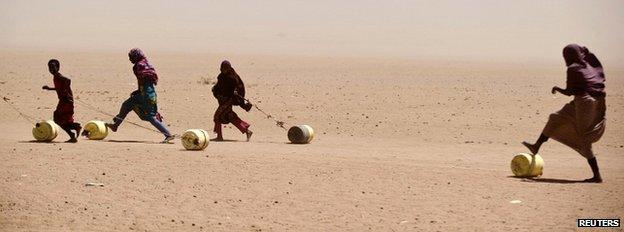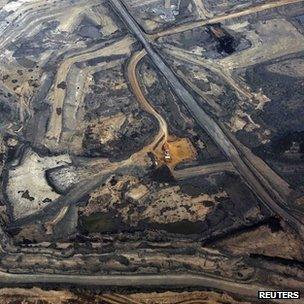Climate summit sees warm words and warming world
- Published

A huge swathe of East Africa has seen severe drought for several years
Despite non-record temperatures this year, the Earth's surface is continuing to get warmer, according to the World Meteorological Organization (WMO).
In its annual briefing, external to the UN climate summit, the agency says 2011 is so far the 10th warmest year on record.
But continued warming was masked by cooling La Nina conditions, it adds.
At the summit, external itself, in the South African city of Durban, delegates discussed Monday's news that Canada may formally renounce the Kyoto Protocol.
The government is concerned that its economic development could be hindered if it takes stronger action on greenhouse gas emissions than the US, its main trading partner.
The developing world is split between countries that share Canada's concern that curbing emissions could damage economic competitiveness, and those that insist curbs are absolutely necessary in order to safeguard their existence against projected climate impacts such as sea level rise.
The WMO briefing will not have given comfort to any delegates hoping that the slowdown in temperature rise observed over the last decade meant global warming had stopped.
Although provisional figures put 2011 as only the 10th warmest on record, the WMO says it has been hotter than any previous year on record that experienced such strong La Nina conditions.
Here, the appearance of relatively cold water at the surface of the eastern Pacific Ocean reduces the average temperature in the atmosphere.
This year's La Nina conditions were also associated with droughts in East Africa, Pacific islands and the southern US, and flooding in southern Africa, eastern Australia and southern Asia.
The agency also points out that the 13 warmest years on record have all occurred in the 15 years since 1997, and that the summer Arctic melt saw sea ice decline to the smallest volume on record.
"Our science is solid, and it proves unequivocally that the world is warming and that this warming is due to human activities," said WMO secretary-general Michel Jarraud.
"Concentrations of greenhouse gases... are very rapidly approaching levels consistent with a 2.0-2.4C rise in average global temperatures, which scientists believe could trigger far-reaching and irreversible changes in our Earth, biosphere and oceans."
Sticking to the rules
Inside the conference halls in Durban, one of the climate convention's sharpest divides - the future of the Kyoto Protocol - was thrown into sharp relief by Canada's announcement that it would not accept further emission cuts under the treaty.

Tar sands exploitation comes at a heavy environmental cost, locally as well as globally
On Monday, Canada's environment minister Peter Kent confirmed the government's decision to reporters in the capital Ottawa.
The current emission targets expire at the end of next year.
Though this helps align Canada with its giant southern neighbour, it has embarked on a collision course with developing nations.
As formal negotiations on the protocol began in Durban, Argentinian delegate Silvia Merega spelled out what the powerful 132-nation G77/China bloc of developing countries was anticipating.
"The Group of 77 and China expects that developed countries put forward ambitious quantified emission reduction commitments under the Kyoto Protocol," she said.
"The protocol, its mechanisms, its rules and its compliance system must be preserved and strengthened for the preservation of the legally-binding, international, multilateral rules-based system created under the [UN climate] convention."
The Canadian CTV network said the country would begin the year-long process of formally withdrawing next month, which Mr Kent declined to confirm or refute.
Russia and Japan have also said they will not make further emission cuts under the protocol, though it is not known whether they plan formally to withdraw.
In Durban, the US deputy climate negotiator Jonathan Pershing said he did not foresee governments changing their existing pledges on curbing emissions by 2020.
"The idea that countries would change their current pledges that they listed in the Cancun agreements [from last year's summit in Mexico] seems unlikely to me," he told reporters.
"I don't see the major economies shifting those actions."
At a meeting of the Major Economies Forum (MEF), external earlier this month - the body that brings together 17 of the world's biggest greenhouse gas emitters - India and Brazil joined the US in wanting to delay beginning talks on a new global climate agreement until at least 2015.
The EU and many smaller developing states want to reach agreement in Durban on starting talks as soon as possible, reaching agreement by 2015 and cutting emissions by 2020.
Reports by numerous organisations, most recently the International Energy Agency, have concluded, external that in order to meet the goal of keeping global average temperature rise since pre-industrial times below 2C, emissions should peak and begin to fall around 2020, if not earlier.
The current pledges to which Mr Pershing referred will not achieve this.
Follow Richard on Twitter, external
- Published28 November 2011
- Published23 November 2011
- Published21 October 2011